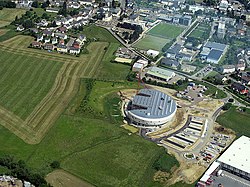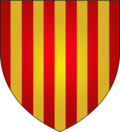Strassen, Luxembourg
 From Wikipedia - Reading time: 9 min
From Wikipedia - Reading time: 9 min
Strassen
Stroossen | |
|---|---|
 | |
|
| |
 Map of Luxembourg with Strassen highlighted in orange, and the canton in dark red | |
| Coordinates: 49°37′09″N 6°04′19″E / 49.6192°N 6.0719°E | |
| Country | |
| Canton | Luxembourg |
| Government | |
| • Mayor | Nicolas Pundel |
| Area | |
• Total | 10.71 km2 (4.14 sq mi) |
| • Rank | 93rd of 100 |
| Highest elevation | 391 m (1,283 ft) |
| • Rank | 60th of 100 |
| Lowest elevation | 265 m (869 ft) |
| • Rank | 68th of 100 |
| Population (2025) | |
• Total | 10,637 |
| • Rank | 12nd of 100 |
| • Density | 990/km2 (2,600/sq mi) |
| • Rank | 8th of 100 |
| Time zone | UTC+1 (CET) |
| • Summer (DST) | UTC+2 (CEST) |
| LAU 2 | LU0000309 |
| Website | strassen.lu |
Strassen (German pronunciation: [ˈʃtʁasn̩] ⓘ; Luxembourgish: Stroossen pronounced [ˈʃtʀoːsən] ⓘ) is a commune and town in central Luxembourg. It is part of the canton of Luxembourg.
In 2023, Strassen's had a population of 10,539 inhabitants. The current mayor of Strassen is Nico Pundel (CSV).
Populated places
[edit]The commune consists of the following villages:
- Strassen
- Reckenthal[a] (lieu-dit)
- Notes
- ^ Partly shared with the city commune of Luxembourg.
History
[edit]Strassen was formed on 6 January 1851, when it was detached from the commune of Bertrange. The law forming Strassen was passed on 6 August 1849.[1]
The origins of the town began in Roman times. The name of Strassen comes from the Latin "strata," which means military road. In Roman times, the Roman road led from Trier through Arlon Strassen and Mamer upwards. Remains of the road were found in 1960 during the widening of Kiem Street. The seal of Johann Strassen (1411) and religious piety dating from 1500 (currently on display at the National Museum of the State), provided the basis for the municipal coat of arms created in 1976 and heraldic description of "Cloche d'or".
Due to a historical plague, one-third of the population of Strassen disappeared.[when?] With the cadastral maps during the time of Maria Theresia (1766) the area of Strassen was 2594.65 acres and the population was 417.
Strassen, along with some houses in Reckenthal, became a parish in 1804. In 1823 the town of Strassen was united with the town of Bertrange, but by a law of August 6, 1849, Strassen was again separated from Bertrange effective 1 January 1850. Thus it became a separate municipality from Reckenthal. At that time, the population consisted of 1300.
In 1850, natives of Luxembourg including some from Strassen, began to emigrate to the United States, The emigrants from Luxembourg started experiencing a high death rate in the US, which discouraged further emigration[citation needed].
In 1854 the national poet Michel Rodange married a citizen of Strassen, by the name of Leysen Magdalene and they moved to Fels where he was a teacher.[citation needed]
The first water main was laid in 1908.
For an entire century, the population did not change much. Strassen in 1946 had 1400 citizens and 332 houses. In 1960 there were 1900 inhabitants and 20 years later 4200. In 1997 there were about 5000 inhabitants, and that number had doubled by 2023.
Population
[edit]This graph was using the legacy Graph extension, which is no longer supported. It needs to be converted to the new Chart extension. |
Urbanism
[edit]Strassen is considered to be one of the smallest communes of the country.[clarification needed]
Due to a strong increase of Luxembourg's population, new districts are seeing the day in Strassen. Strassen has been ranked as the third most expensive commune in Luxembourg, with, as of Q2 2024, an average real estate price of €9,798 per square meter for existing properties and €11,500 per square meter for new properties.[3] Strassen is also popular with expatriates, given its proximity to Luxembourg City, and its quality of life.[citation needed]
As in many other communes in Luxembourg, Strassen has a private aquatic center (built in October 2009) named Les Thermes, with a cost of €35,000,000.[4] Luxembourg's national center of archery and the center of martial arts[5] are also located in Strassen.
Culture
[edit]In September the biennial Stroossefestival takes part in central Strassen, with performances, food stalls, and attractions for all ages.[6]
Transport
[edit]Like elsewhere in the Grand Duchy of Luxembourg, public transport is effective and fast. There are buses (ecological hybrids) that connect to Luxembourg City. Strassen has provided for its citizens, a city night shuttle bus service.
Education
[edit]In the municipal area, there are 4 schools, all modern and well equipped. In primary school, students lessons are in the three official languages of the country. The primary in Luxembourgish and the secondary language is German, while studying the prospect of having the second language cycle in French and the third language cycle in English.
Notable Person
[edit]- Bernard of Luxemburg (d. 1535), Dominican theologian
References
[edit]- ^ (in French and German) "Mémorial A, 1849, No. 78" (PDF). Service central de législation. Retrieved 2006-08-15.
- ^ "Population par canton et commune". statistiques.public.lu. Retrieved 11 January 2022.
- ^ observatoire.liser.lu
- ^ "Piscines au Luxembourg: Quand chaque visiteur coûte de l'argent". Wort.lu (in French). 2014-07-17. Retrieved 2020-11-05.
- ^ 5minutes.rtl.lu
- ^ (in French and German) "Stroosefestival lu" (website). Retrieved 2017-12-05.
 KSF
KSF
